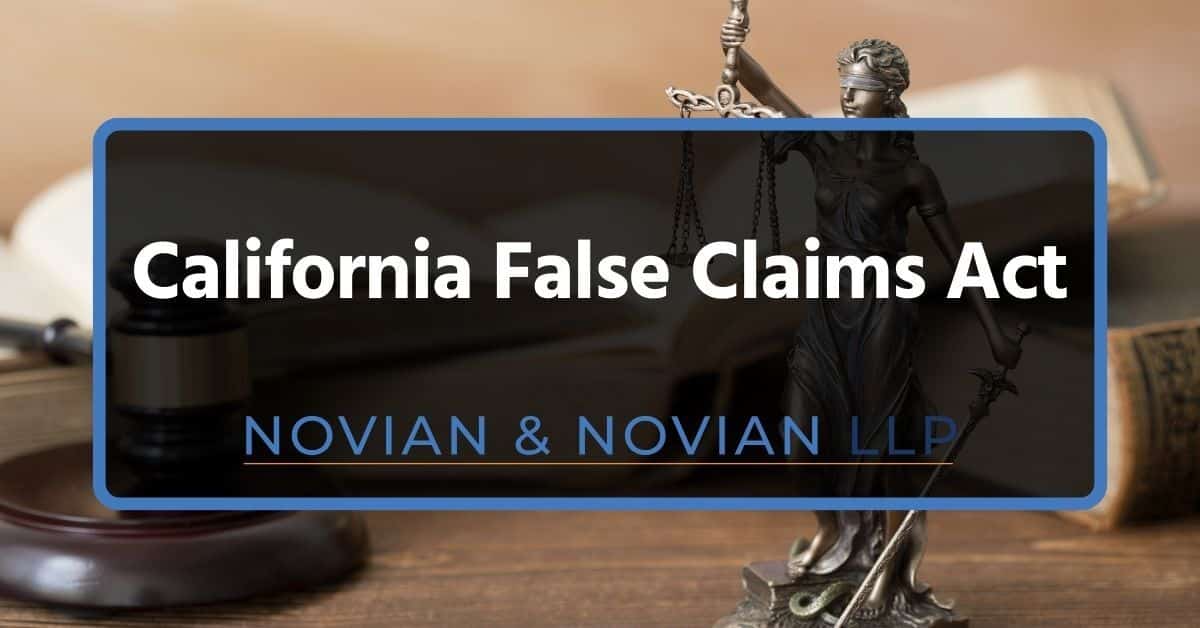
The California False Claims Act (CFCA) is a significant piece of legislation aimed at fighting fraud against government programs in California. The CFCA allows private citizens, also known as whistleblowers or realtors, to file lawsuits on behalf of the state against individuals or entities that have defrauded California’s government programs. Additionally, the CFCA encourages people to bring legal action if they have any knowledge of false or fraudulent claims submitted to the state.
The act incentivizes whistleblowers by offering a portion of any recovered funds as a reward. This encourages people to come forward with information about fraudulent activities.
It covers a wide range of fraudulent activities, including but not limited to healthcare fraud, government contracting fraud, and other types of fraud involving state funds. The CFCA includes provisions to protect whistleblowers from retaliation by their employers, ensuring that individuals can report fraud without fear of losing their jobs or facing harassment.
At Novian & Novian, we provide expert legal advice on the intricacies of the CFCA, helping you understand your rights and obligations. With over 35 years of industry experience, we have authoritative legal knowledge and can help you through the complex processes of filing claims.
Our goal is to build and maintain a trustworthy relationship with our clients. Contacting us, today for a free consultation.
In this article, we will walk you through the California False Claims Act, its origin and key provisions. We will also highlight the steps involved in filing a false claim case under the CFCA.
Origins of the False Claims Act in the United States
The origins of the False Claims Act (FCA) in the United States date back to the Civil War era. The FCA was enacted in 1863, primarily to combat fraud by suppliers to the Union Army. Known colloquially as the “Lincoln Law,” it introduced the qui tam provision, allowing private individuals, also known as realtors, to sue on behalf of the government for false claims and receive a portion of the recovered damages.
The CFCA was enacted in 1987 and stands as one of the oldest qui tam actions. Qui tam lawsuits allow an individual to bring a claim against a person or company, who made a false statement, on behalf of the government.
Over the years, the CFCA has been amended to broaden its scope. This includes expanding the definition of a false claim and the types of actions that can be considered fraudulent under the act.
Amendments have strengthened protections for whistleblowers, ensuring they are safeguarded against retaliation and discrimination for filing a claim or participating in an investigation. Changes have also been made to the percentage of the recovery that a whistleblower can receive, balancing incentives for reporting fraud with the state’s interest in recovering funds. They can now receive up to 30%
As the federal FCA has evolved, the CFCA has also been updated to reflect these changes, ensuring consistency in combating fraud at both state and federal levels.
Key Provisions of the California False Claims Act
The California False Claims Act (CFCA) prohibits various actions, including: (a) knowingly presenting or causing the presentation of a false or fraudulent claim for payment or approval; (b) knowingly creating or using a false record or statement crucial to a false or fraudulent claim; (c) conspiring to violate the CFCA; (d) having control over public property or money intended for the State or any political subdivision and knowingly delivering less than the entirety of that property; (e) knowingly creating or using a false record or statement vital to an obligation to pay or transmit money or property to the State or any political subdivision, or knowingly concealing, improperly avoiding, or reducing such obligation; or (f) benefiting from an unintentional submission of a false claim, discovering its falsity, and failing to disclose it to the State or the political subdivision within a reasonable time after discovery, as outlined in California Government Code Section 12651.
Under the CFCA, various parties can be held liable for false claims violations. This ranges from entities and organizations, individuals, government contractors, and also beneficiaries of false claims submitted.
Comparison with the Federal False Claims Act
In comparison with the Federal False Claims Act, CFCA is state-specific. It targets state-funded programs and contracts in California. However, the Federal False Claims Act applies to fraud involving any federally funded program or contract.
Both acts have provisions for qui tam lawsuits, allowing private citizens to sue on behalf of the government and share in the recovery.
The federal FCA and the CFCA impose treble damages. This means that the defendant may be required to pay three times the amount of the government’s loss, plus additional penalties.
Both acts offer protections to whistleblowers, but the specific provisions and the extent of protection may vary. The timeframe within which a lawsuit must be filed under both acts can differ, with specific conditions determining the applicable period.
The Whistleblower Provision
A whistleblower, in the context of the CFCA, is an individual who reports misconduct, typically involving false claims submitted for payment to the state government. This individual is often an insider with unique access to information about these false claims.
Whistleblowers are essential in identifying and reporting fraudulent activities that might otherwise go undetected. They can initiate a qui tam lawsuit, which is a legal action filed on behalf of the state to recover funds lost to fraud. In successful cases, whistleblowers can receive a portion of the recovered funds as a reward.
The CFCA encourages whistleblowers or relators to come forward and report violations. A whistleblower is an individual who reports abuse, corruption, fraud, waste, or dangers to public health. Whistleblowers, if they meet certain criteria, may be eligible to file lawsuits on behalf of the government and receive a percentage of the recovered damages. This provision is intended to incentivize individuals with knowledge of fraud
Whistleblowers are often instrumental in bringing to light complex fraud schemes that might be difficult for the government to detect on its own. By initiating qui tam lawsuits, whistleblowers have helped the state of California recover billions of dollars that were falsely claimed.
The existence of the whistleblower provision and the successful prosecution of fraud cases act as a deterrent to organizations and individuals considering engaging in fraudulent activities. Whistleblowers help maintain public trust in government programs by ensuring that funds are used as intended and not lost to fraud.
Protections Offered to Whistleblowers
The CFCA includes provisions that protect whistleblowers from retaliation by their employers. This includes protection against firing, demotion, suspension, threats, harassment, or any other form of discrimination.
If a whistleblower is retaliated against, they have the right to file a lawsuit seeking compensation, including reinstatement, double back pay with interest, and compensation for any special damages sustained. In some cases, whistleblowers can remain anonymous during the initial stages of the investigation to protect their identity and safety.
Also, employers are prohibited from retaliating against employees who refuse to participate in activities that could lead to the violation of state or federal statutes, or noncompliance with state or federal rules or regulations.
Legal Process and Procedures
Under the California False Claims Act (CFCA) and California law, the process for filing false claims act cases for civil legal proceedings involves several steps, and the state government plays a crucial role in these cases. Additionally, violations of the CFCA can lead to significant penalties.
To file false claims act cases, the whistleblower or realtor must gather sufficient evidence to support the claim of fraud against the state government. Typically, the whistleblower should seek legal representation to help navigate the complexities of the CFCA and to file the lawsuit.
Then, the whistleblower’s attorney files a complaint under seal in a California Superior Court. The complaint remains under seal to allow the government to investigate the allegations without public knowledge.
The state government will review the evidence and decide whether to intervene in the case. The government may conduct its investigation during this period. If the government decides to intervene, it takes over the prosecution of the case. If it declines, the whistleblower may proceed with the case independently.
The case proceeds through the court system, where both sides present evidence. This stage may involve pre-trial motions, discovery, and, if necessary, a trial. The case may be resolved either through a negotiated settlement or a court judgment.
Violators of the CFCA can face substantial financial penalties, including treble damages (three times the amount of the government’s loss) and additional fines. In some cases, violators may also face criminal charges, depending on the severity of the fraud. However, many CFCA cases are resolved through settlements, where the defendant agrees to pay a specified amount without admitting liability.
At Novian & Novian, we have a team that can assist in gathering and organizing evidence to build a strong case. We pride ourselves in ensuring confidentiality and providing trustworthy guidance throughout the legal process.
Challenges and Criticisms
The California False Claims Act (CFCA) is a critical tool in fighting fraud against state government programs. But like any complex legislation, it faces challenges in implementation and enforcement, has been subject to criticisms, and has undergone efforts for improvement and refinement.
One of the biggest challenges is the detection of sophisticated fraud schemes, which often require specialized knowledge and extensive investigation. State agencies may have limited resources for investigating and prosecuting false claim cases, leading to delays and potential backlogs.
The legal intricacies of the CFCA can pose challenges for both whistleblowers and the state in proving fraud, especially in cases involving complex financial transactions. Also, potential whistleblowers may be hesitant to come forward due to fear of retaliation, despite the protections in place.
Critics argue that the CFCA can lead to overzealous prosecutions, putting undue pressure on businesses and individuals who may make honest mistakes. Proponents assert that the CFCA’s requirement for the claimant to demonstrate that the defendant “knowingly” submitted a false claim acts as a safeguard against unjust prosecution.
Some contend that the CFCA may create a chilling effect on businesses, particularly those engaging in large and complex transactions with the state. On the other hand, supporters of the Act point out that honest businesses with proper compliance programs have nothing to fear, and the Act targets only fraudulent activities.
There is a concern that the qui tam provision could encourage frivolous lawsuits by individuals seeking a portion of the recovery. But, it is important to keep in mind that the CFCA includes stringent legal requirements for filing a lawsuit, and frivolous claims are often dismissed at an early stage.
Over the years, there have been amendments to the CFCA to clarify its provisions, refine the definitions of false claims, and adjust the whistleblower reward structure. Efforts have also been made to strengthen protections for whistleblowers, encouraging more individuals to report fraud without fear of retaliation.
Increasing funding and resources to state agencies responsible for investigating and prosecuting CFCA claims can improve enforcement efficiency. Educating potential whistleblowers about their rights and the protections available under the CFCA can help in overcoming reluctance to report fraud.
In addition, collaborations between the state and private sector can help in identifying best practices for compliance and fraud prevention.
Conclusion
In summary, the CFCA is a critical legislative tool designed to combat fraud against the state government. It allows whistleblowers, or realtors, to file lawsuits on behalf of the state against entities that submit fraudulent claims for state funds. Key aspects of the CFCA include prohibitions against various fraudulent actions, whistleblower protections, and the qui tam provision that incentivizes individuals to report fraud. Efforts to improve the CFCA involve legislative amendments, enhanced whistleblower protections, better resource allocation for enforcement, and educational initiatives to increase awareness about the Act.
If you believe you have information about a potential false claim against the California government, or if you’re facing allegations under the CFCA, don’t navigate these complex waters alone! Contact us for expert legal counsel and representation. Our team is equipped to guide you through every step of the process, ensuring your rights are protected and your case is handled with the utmost professionalism and skill.
Reach out to Novian & Novian today to schedule a consultation and take the first step towards addressing your CFCA concerns.
Contact Us
Have questions about this post? Novian & Novian is a full service law firm in Los Angeles with clients that span the country. Contact us today for a free consultation.
Contact Us
Have questions about this post? Novian & Novian is a full service law firm in Los Angeles with clients that span the country. Contact us today for a free consultation.




